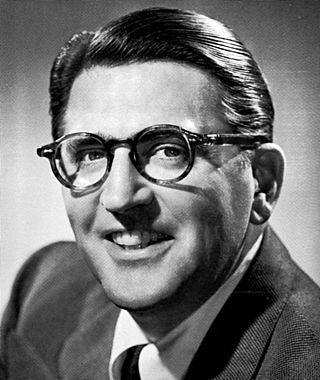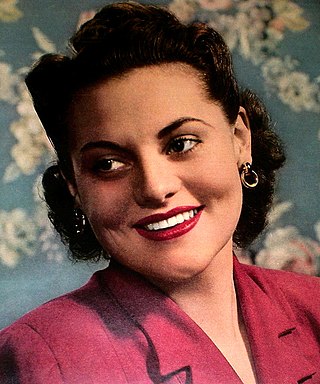Related Research Articles

Oliver Burgess Meredith was an American actor and filmmaker whose career encompassed radio, theater, film, and television.

Robert Reiniger Meredith Willson was an American flautist, composer, conductor, musical arranger, bandleader, playwright, and writer. He is perhaps best known for writing the book, music, and lyrics for the 1957 hit Broadway musical The Music Man and "It's Beginning to Look a Lot Like Christmas" (1951). Willson wrote three other musicals, two of which appeared on Broadway, and composed symphonies and popular songs. He was twice nominated for Academy Awards for film scores.

Jeanne Carolyn Cagney was an American film, stage, and television actress.

Rita Ann Johnson was an American actress.

John Lund was an American film, stage, and radio actor who is probably best remembered for his role in the film A Foreign Affair (1948) and a dual role in To Each His Own (1946).

Eileen Barton was an American singer best known for her 1950 hit song, "If I Knew You Were Comin' I'd've Baked a Cake."

Norma Zimmer was an American vocalist, best remembered for her 22-year tenure as Lawrence Welk's "Champagne Lady" on The Lawrence Welk Show.

Ben Gage was an American radio singer and announcer, occasional off-screen film singer dubbing the voice of non-singing actors, and television actor active from 1937 to 1975. Born in Chicago, Illinois, his first wife was Esther Williams.

Virginia Ellen Simms was an American popular singer and film actress.

Mark Warnow was an American violinist and orchestra conductor, who performed on the radio in the 1930s and 1940s. He was the older brother of composer and bandleader Raymond Scott, born Harry Warnow, and is credited with steering his younger brother into a career in music.
Jeff Alexander was an American conductor, arranger, and composer of film, radio and television scores.
Lesley Woods was an American radio, stage and television actress. She was a graduate of the Goodman School of Drama in Chicago.

The Ford Sunday Evening Hour is an American concert radio series sponsored by the Ford Motor Company. The hour-long program was broadcast from 1934 to 1946, with a hiatus from 1942 to 1945. Later known as The Ford Symphony Hour, the program presented selections of classical music, hymns, popular ballads and well-known arias.
Philip Morris Playhouse is a 30-minute old-time radio dramatic anthology series.

Annette Warren is an American vocalist and jazz stylist who dubbed the singing voices of such stars as Lucille Ball in Sorrowful Jones (1949) and Fancy Pants (1950), and Ava Gardner in the 1951 film version of Show Boat. She was still actively performing in 2017 at the age of 95.

The Frank Sinatra Show was a title applied—in some cases specifically and in other cases generically—to several radio musical programs in the United States, some of which had other distinct titles as indicated below. Singer Frank Sinatra starred in the programs, some of which were broadcast on CBS, while others were on NBC.

Joan Edwards was an American film actress and singer-songwriter in the old-time radio era. She was perhaps best known for her work on the radio version of Your Hit Parade. She also was a vocalist for Paul Whiteman and his Orchestra.

Hollace Shaw was a coloratura soprano who performed on old-time radio and on the stage.

Margherita Maria Francesca LaCentra was an American contralto singer, best known for her work on old-time radio and her singing with Artie Shaw's orchestra. She also performed as Barbara Fulton.
Hap Hazard is an American old-time radio comedy-variety program that was broadcast on NBC-Red beginning on July 1, 1941 and on CBS beginning in January 1942.
References
- ↑ Dunning, John (1998). On the Air: The Encyclopedia of Old-Time Radio (Revised ed.). New York, NY: Oxford University Press. p. 455. ISBN 978-0-19-507678-3 . Retrieved 2019-10-09.
- ↑ ""Coffee Time" A Musical for 13-Wk. Summer Period" (PDF). Radio Daily. May 23, 1946. p. 6. Retrieved 10 August 2015.
- 1 2 3 4 Skipper, John C. (2000). Meredith Willson: The Unsinkable Music Man. Da Capo Press. pp. 84–85. ISBN 9781882810789 . Retrieved 8 August 2015.
- ↑ "CCNY Plaque Winners Announced" (PDF). Broadcasting. March 31, 1947. p. 20. Retrieved 11 August 2015.
- ↑ "To Drop 'Sparkle Time'" (PDF). Broadcasting. March 10, 1947. p. 87. Retrieved 11 August 2015.
- 1 2 3 "'Sparkle Time With Meredith Willson' Heard on WHP Friday Nights, 7.30". Harrisburg Telegraph. September 28, 1946. p. 19. Retrieved August 11, 2015– via Newspapers.com.

- ↑ "Seattle Soprano to Make Radio Debut on 'Sparkle Time' on WHP". Harrisburg Telegraph. November 2, 1946. p. 19. Retrieved August 10, 2015– via Newspapers.com.

- ↑ "D.H.S. Game On WSOY-FM". The Decatur Herald. November 22, 1946. p. 22. Retrieved August 11, 2015– via Newspapers.com.

- ↑ "Guest Singer". Harrisburg Telegraph. December 28, 1946. p. 17. Retrieved September 4, 2015– via Newspapers.com.

- ↑ "A.A.F. Vet on Sparkle Time". The Decatur Herald. January 17, 1947. p. 11. Retrieved August 10, 2015– via Newspapers.com.

- ↑ ""Sparkle Time" Introduces New Mezzo-Soprano". Harrisburg Telegraph. January 25, 1947. p. 17. Retrieved August 11, 2015– via Newspapers.com.

- ↑ "On The Beam". The Mason City Globe-Gazette. February 14, 1947. p. 2. Retrieved August 10, 2015– via Newspapers.com.

- ↑ "On The Beam". The Mason City Globe-Gazette. February 28, 1947. p. 1. Retrieved August 11, 2015– via Newspapers.com.

- ↑ "'Sparkle Time' Guest Plays Rare Violin, Gift of Jascha Heifetz". Harrisburg Telegraph. March 1, 1947. p. 19. Retrieved August 10, 2015– via Newspapers.com.

- ↑ "Simms, Disney Writer Paired". The Decatur Daily Review. March 28, 1947. p. 7. Retrieved August 11, 2015– via Newspapers.com.

- ↑ Oates, Bill (2005). Meredith Willson - America's Music Man: The Whole Broadway-Symphonic-Radio-Motion Picture Story. p. 85. ISBN 9781420835250.
- 1 2 August, Ann (January 3, 1949). "The Talking People" (PDF). Broadcasting. p. 35. Retrieved 10 August 2015.
- ↑ "'Ford Showroom' Set For Wednesday, 9.30 P.M.; Meredith Willson Stars". Harrisburg Telegraph. June 14, 1947. p. 19. Retrieved August 10, 2015– via Newspapers.com.

- ↑ "On The Beam". The Mason City Globe-Gazette. October 11, 1946. p. 2. Retrieved August 10, 2015– via Newspapers.com.

- ↑ "Willson Heads Conga Line". Harrisburg Telegraph. January 11, 1947. p. 19. Retrieved August 10, 2015– via Newspapers.com.

- ↑ "Agencies" (PDF). Broadcasting. September 9, 1946. p. 50. Retrieved 10 August 2015.